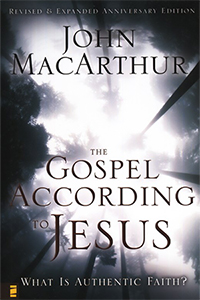I just finished the book “The Gospel According to Jesus: What Is Authentic Faith?” The book was written by John MacArthur of Grace to You and Chancellor Emeritus of Master’s University and Seminary. With his decades in ministry and service of his church and the Kingdom, he has written numerous books ranging across many topics. As is conventional within his teaching and written work, his views are thoroughly based upon the Word and what is intended by the biblical authors of Scripture. Often he also references the root meaning of historical terms from early biblical languages to lend support to principles he writes about.
This book was written to counter an emerging form of antinomianism in the Church. Today sometimes also referred to as “easy-believism.” That for salvation, it is enough to acknowledge, agree, or accept Christ Jesus as Messiah, Savior, and Lord without fruit or work that follows from that form of recognition and acceptance. To affirm and live out Jesus as the Lord of one’s life. While MacArthur recognizes that salvation is accomplished by grace through faith alone, as clearly written in Scripture (Eph 2:8-9), he writes that where there is no evidence of saving faith by repentance, complete surrender of one’s life to Christ, and inevitable fruits of the Spirit, a person’s faith does not save and is not or was not authentic.
While there are at times seasons of withdrawal from God, periods of rebellious living, or spiritual dryness, MacArthur reaffirms in this book, once-saved, always saved (OSAS). The probing questions, observations, and answers in the book that get controversial attention concern whether or not those who bear no fruit, or fall-away, have or had authentic faith in the first place.
To carry on in a continuous practice of rebellion and a longstanding lifestyle of indifferent conduct after acceptance of Christ with a profession of faith means the person’s assent of confession and acknowledgment was not an experience of true conversion or true saving faith and there is no reason to conclude there is an indwelling of the Holy Spirit in a professing believer’s life. Where, conversely, there is a spiritual and meaningful substance to the event of becoming born-again that has a lasting effect.
The book clearly articulates what Jesus did when He heralded His gospel. Not only what He did, but also how He did it during His time with us. Through various discourses in Scripture, we are given numerous stories, parables, and explanations to illustrate His gospel. Moreover, he explains His gospel through the call to repentance, the nature of true faith, the promise of justification, the way of salvation, the certainty of judgment, the cost of discipleship, and His Lordship.
Finally, to conclude the book, MacArthur provides appendices including actual questions & answers to support the Scriptural assertions he makes to bring a full awareness about the total commitment to Christ’s Lordship and His work in the lives of believers. Namely, what it was that the apostles and prior Church leaders down through the centuries believed and wrote about concerning Lordship as a secondary, but necessary artifact of faith to substantiate salvation. Not “faith plus works” for a salvific outcome, but faith alone with inevitable fruit that grows from a tree of workmanship newly planted in a believer’s life.
Anyone who wishes to get a Scriptural, coherent, and doctrinally sound view that calls out the error of the “hyper-grace” movement, this book is a must-read.












